A summary of all categories of the 2025 (35th) Ig Nobel Prize, which recognizes 'unique research that makes people laugh and think,' and Japanese people have won for the 19th consecutive year

The 35th Ig Nobel Prizes, a parody of the Nobel Prizes sponsored by the American scientific journal Improbable Research, were held at Boston University on September 19, 2025, at 7 a.m. Japan time. Prizes were awarded in 10 categories to 'interesting research that makes people laugh and think.' The awards included a Japanese research group, making this the 31st time that Japanese people have won an Ig Nobel Prize, and the 19th year in a row.
The 35th First Annual Ig Nobel Prize Ceremony – Improbable Research
・List of departments
◆ Literary Award
◆Psychology Award
Nutrition Award
Pediatrics Award
◆Biology Award
Chemistry Award
Peace Prize
◆Engineering Design Award
◆Aviation Award
◆Physics Prize
The 35th Ig Nobel Prize Ceremony was held in the ballroom of the George Sherman Union, a student dormitory at Boston University in Massachusetts, USA.

The theme for 2025 was 'Digestion.' In addition to the awards ceremony, a program related to this theme was also presented.

At the Ig Nobel Prize ceremony, winners are given speeches. However, there is a time limit of 60 seconds. To ensure the ceremony runs smoothly, an 8-year-old girl called 'Miss Sweetie Poo' repeatedly shouts 'Stop your speech, I'm bored' as the time limit approaches. This is the highlight of the ceremony.

However, since Miss Sweetie Poo was unable to attend this event, researcher Gary Dreyfuss took over in her place, donning an apron.

Winners receive a trophy made of a stomach model with a human face painted on it, as well as a certificate of their award, which is signed by a real Nobel laureate as witness.

The prize money used to be 10 trillion Zimbabwean dollars every year, but this year it will be a disposable wet towel because 'it has risen in price due to inflation.'
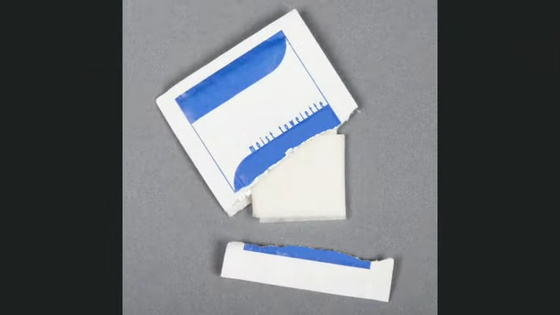
◆ Literature Award: For persistently recording and analyzing the growth rate of his own fingernails over a period of 35 years
The Literature Prize went to William B. Bean, who spent 35 years recording the rate at which his own and his family's fingernails grew. Bean's book not only documents the length of his nails, but also includes references to medieval astrology and the American novel '
A Note on Fingernail Growth - ScienceDirect
https://www.sciencedirect.com/science/article/pii/S0022202X15483861
Mr. Bean, who is deceased at the time of writing, was honored at the awards ceremony by his son, Bennett Bean.
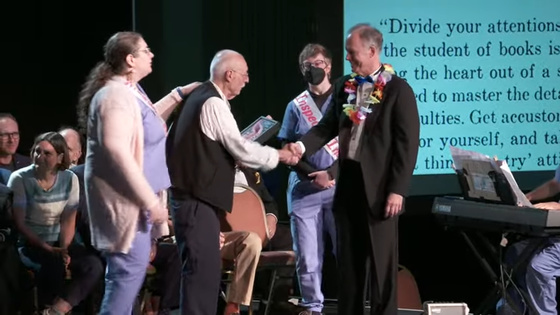
The actual nail length measurements and a portrait of Mr. Bean. Mr. Bennett commented, 'As long as you're there and your nails are there, we can keep measuring indefinitely.'
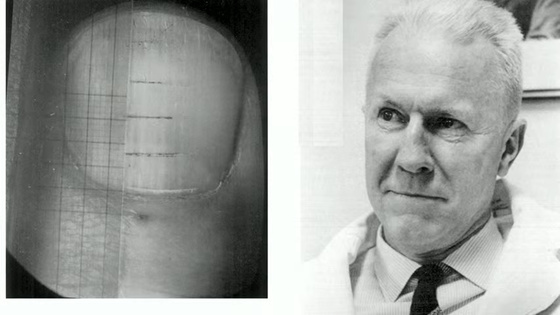
Psychology Award: For research into what happens when you tell people, including narcissists, that they are intelligent.
The Psychology Prize went to Marcin Zajenkowski and Gilles Gignac, psychologists at the University of Warsaw.
Telling people they are intelligent correlates with the feeling of narcissistic uniqueness: The influence of IQ feedback on temporary state narcissism - ScienceDirect
Zajenkowski and his colleagues recruited 361 participants in Poland, asking them to rate their own intelligence relative to others, then answer a Polish version of the Narcissistic Personality Inventory, and then take an IQ test to compare their perception of their intelligence with objective measures. They then randomly assigned the participants to one of two groups. One group received positive feedback, telling them that they 'certainly have a higher IQ than most people,' while the other group received negative feedback.
The results of the experiment showed that participants who received positive feedback after an IQ test experienced an increased sense of 'uniqueness,' a key aspect of grandiose narcissism. Zajenkowski and his colleagues concluded that external feedback, regardless of its accuracy, helps shape an individual's self-perception of their intelligence.
During their speeches, Zajenkowski and Gignac roused the audience to the tune of 'If You're Happy and You Know It, Clap Your Hands,' encouraging them to 'clap your hands if you know you're special.'
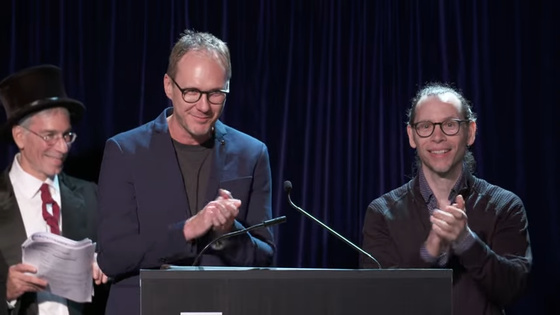
Nutrition Award: For studying the preference of rainbow lizards in West Africa for eating certain types of pizza.
The Nutrition Prize was awarded to a collaborative research group from Nigeria, Italy, Togo and France.
African Journal of Ecology | Ecology Journal | Wiley Online Library
After witnessing rainbow lizards stealing and eating tourists' pizzas on the coast of West Africa, Dendy and his team conducted an experiment to determine whether this behavior is common and whether the lizards have a preferred topping. In the experiment, the lizards were given a choice between a four-cheese pizza and an à la carte pizza. The lizards only ate the four-cheese pizza. Based on these results, the research team speculates that the lizards may be attracted to the chemical cues of cheese, or that it's easier to digest.
Luca Luiselli, the research leader, was unable to attend the event, so Esther Duflo , winner of the 2019 Nobel Prize in Economics, read the speech instead, saying, 'The French people will stand in for the Italian researchers.'
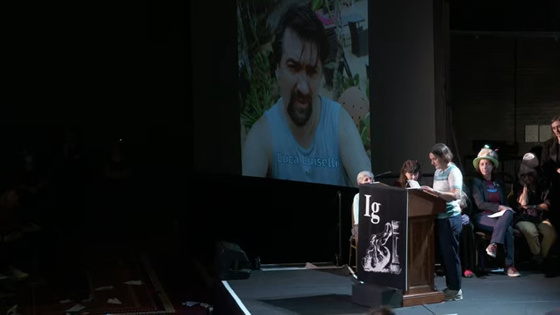
Pediatrics Award: For her research into how garlic consumption by nursing mothers changes the smell of breast milk and how this affects baby behavior.
The 2025 Ig Nobel Prize in Pediatrics was awarded to an American research team for their research into how garlic consumption by nursing mothers changes the smell of breast milk and affects the behavior of their babies.
Maternal diet alters the sensory qualities of human milk and the nursing's behavior - PubMed
The experiment confirmed that after mothers took garlic capsules, their breast milk had a distinctly stronger garlic smell. Furthermore, babies who drank the garlic-flavored breast milk latched on to the breast for longer and exhibited greater sucking behavior. This research suggests that sensory experiences during breastfeeding may influence babies' acceptance of new foods after weaning and their future food preferences.
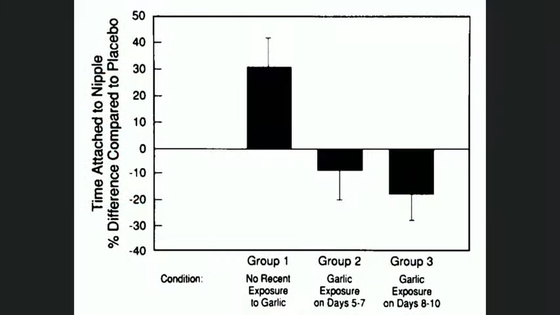
Gary Beauchamp, a biologist at the University of Chicago, will be giving his award speech with an illustration of garlic.

However, the speech exceeded the time limit and the overly strong Miss Sweetie Poo came to complain, so the speech was forced to end.
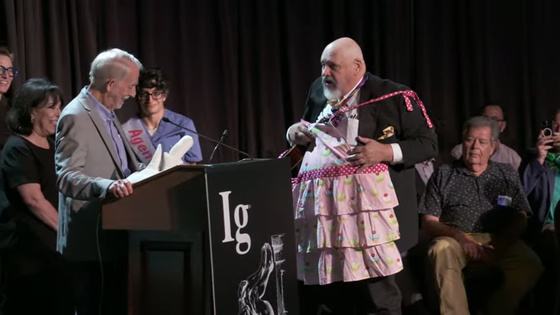
Biology Prize: For an experiment to see whether painting zebra-like stripes on cows could help them avoid horsefly bites.
The Biology Prize went to a research team from the Aichi Prefectural Agricultural Experiment Station in Japan, who tested whether painting cows with zebra-like stripes could protect them from horsefly bites.
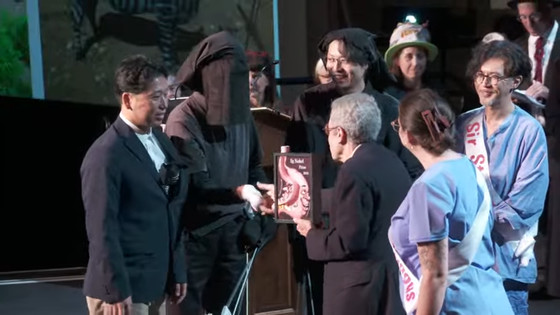
Horseflies are serious pests for livestock, and the behaviors that cows engage in to avoid them can reduce feeding time and increase stress, ultimately negatively impacting milk and beef production and leading to economic losses. The research team painted zebra patterns on Japanese Black cattle and compared them with cows without stripes or cows painted with only black stripes. The results confirmed that the number of horseflies attached to the zebra-patterned cows was significantly reduced compared to the other cows, and that their behavior to fend off horseflies was also significantly reduced.
This research is also discussed in the following article:
Painting a cow with zebra stripes halves the number of blood-sucking flies - GIGAZINE

At the award ceremony, research member Tomotaka Kojima gave a speech.
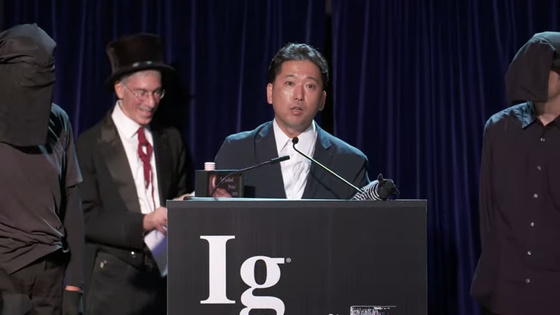
The surrounding black people began attacking Kojima with pictures and stuffed toys of horseflies.
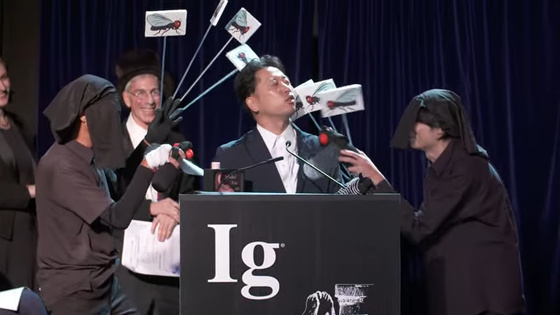
Unable to resist, Kojima took off his jacket during his speech, revealing that he was wearing a zebra-patterned shirt underneath.
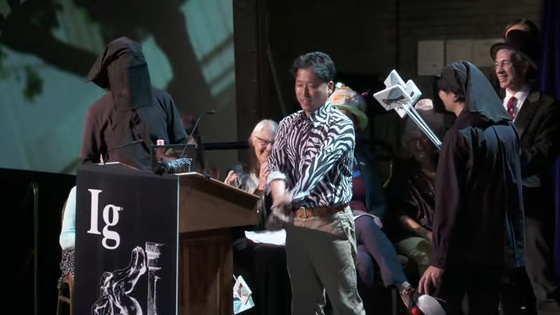
By showing the zebra pattern, the horsefly attacks stopped.
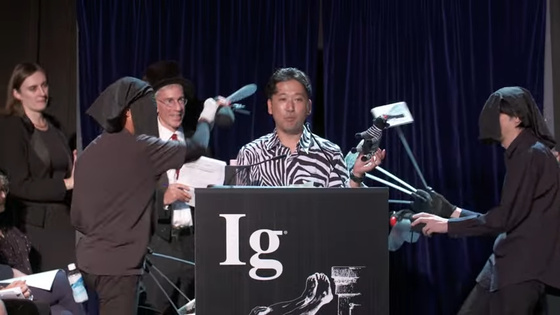
◆Chemistry Prize: For an experiment to see whether mixing Teflon powder into food can make people feel full without increasing calories.
The chemistry prize went to a team of American and Israeli researchers led by Rotem Naftalovich, an anesthesiologist at St. Barnabas Medical Center.
Polytetrafluoroethylene Ingestion as a Way to Increase Food Volume and Hence Satiety Without Increasing Calorie Content - Rotem Naftalovich, Daniel Naftalovich, Frank L. Greenway, 2016
The study examined whether adding Teflon (PTFE) powder, a material commonly used in non-stick coatings on frying pans, to food could increase the overall volume and weight of food and increase satiety without increasing calories. The researchers suggested that because Teflon is indigestible and tasteless, it could potentially be used as an additive to create zero-calorie foods, similar to artificial sweeteners.
As the laureate was unable to attend the ceremony, the speech was read on his behalf by Munji Bawendi , the 2023 Nobel Prize Laureate in Chemistry.

Peace Prize: For research showing that drinking alcohol can improve the ability to speak a foreign language
The Peace Prize was awarded to a team led by Fritz Renner of Maastricht University, Inju Kaasbergen, Matt Field and Jessica Belsman of the University of Liverpool, for their work examining the urban myth that consuming small amounts of alcohol can improve one's ability to speak a foreign language.
Dutch courage? Effects of acute alcohol consumption on self-ratings and observer ratings of foreign language skills - Fritz Renner, Inge Kersbergen, Matt Field, Jessica Werthmann, 2018
The researchers found that participants who drank small amounts of vodka were rated better as fluent in a foreign language by native speakers, possibly because alcohol reduces language anxiety.
The speeches were read by Robert Merton , winner of the 1997 Nobel Prize in Economics, and Svante Pääbo, winner of the 2022 Nobel Prize in Physiology or Medicine. Renner and his colleagues say the starting point for this research was a realization they had while visiting a bar on the night of an international conference: 'Drunk Germans pronounce Dutch better than sober Germans.'
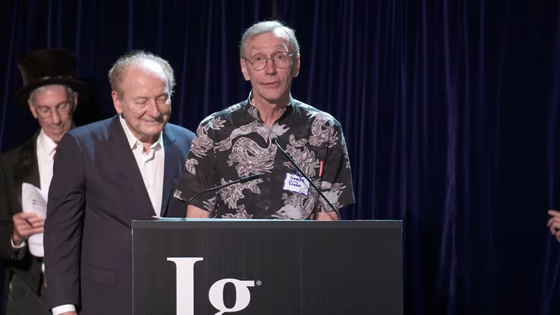
◆ Engineering Design Award: For a study analyzing the impact of bad-smelling shoes on the user experience of shoe cabinets from an engineering design perspective
Indian researchers Vikash Kumar and Sarthak Mittal won the Engineering Design Award for their research into why bad-smelling shoes were left outside shoe lockers in student dormitories.
Smelly Shoes—An Opportunity for Shoe Rack Re-Design | SpringerLink
Kumar and his colleagues analyzed how smelly shoes affect the comfortable experience of using a shoe cabinet from an engineering design perspective. Focusing on the problem of bad shoe odors in India's hot and humid environment, they designed and developed a shoe cabinet with built-in UV-C tube lights to kill the bacteria (Kytococcus sedentarius) that causes the odor.

Aviation Award: For research into whether alcohol consumption impairs the flight and echolocation abilities of Egyptian fruit bats
The Aviation Prize was awarded to a Columbia-German-Israeli research team for their work investigating the effects of alcohol consumption on the flight and echolocation abilities of Egyptian fruit bats.
Ethanol ingestion affects flight performance and echolocation in Egyptian fruit bats - ScienceDirect
In nature, natural alcohol is produced in ripe fruits and other foods, which are consumed by various animals. Rare cases have been reported in which animals that ate fruits containing a high amount of alcohol became intoxicated, resulting in reduced athletic performance and increased susceptibility to predation and accidents. The research team noticed that Egyptian fruit bats tend to avoid fruits with high alcohol concentrations, and suspected that this may be to avoid becoming intoxicated, so they conducted an experiment.
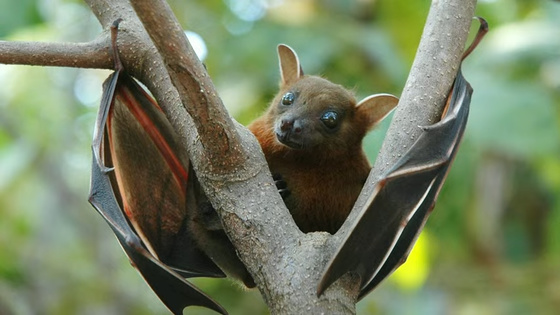
The researchers conducted experiments using adult male bats housed in outdoor long-distance flight cages. They presented the bats with liquid diets containing various concentrations of ethanol and measured the time it took them to fly from one end of the cage to the other. They also used ultrasonic microphones to record the bats' echolocation calls.
The results showed that bats that consumed the highest concentrations of ethanol had longer flight times and impaired flight performance, and that the quality of their echolocation was also adversely affected, increasing their risk of collisions with obstacles during flight.
The award winners talk to a stuffed bat during their speeches.
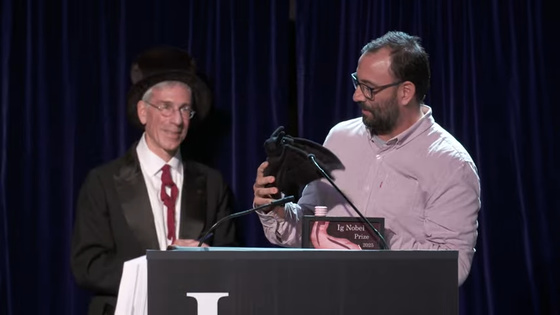
However, the speech was too long, and Miss Sweetie Poo repeatedly said, 'I'm bored,' and with a troubled look on her face, she left the room.
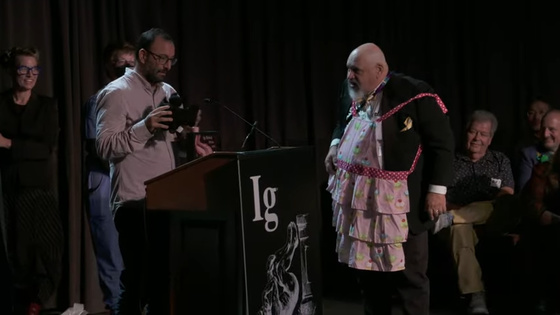
Physics Prize: For discovering the physical causes of clumping in pasta sauces, particularly cacio e pepe, and the cooking method to prevent this.
A joint research team from the Max Planck Institute for the Physics of Complex Systems, the University of Barcelona, and the Austrian Institute of Science and Technology has been awarded the 2025 Ig Nobel Prize in Physics. The award recognizes their scientific research into the boiling temperature and starch concentration of pasta to create the sauce for cacio e pepe, a traditional Roman pasta dish.
For more details about the winning research, please read the article below.

The award winners dressed like chefs.
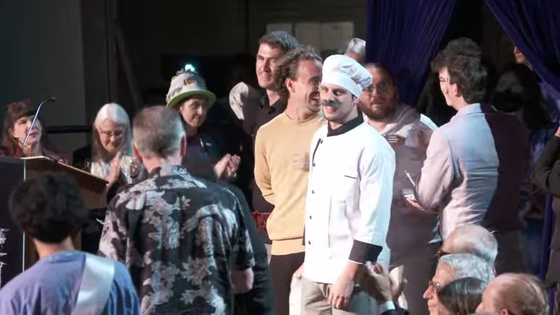
He greeted everyone in Italian style with 'Ciao Mama!' and started eating pasta while singing during his speech.
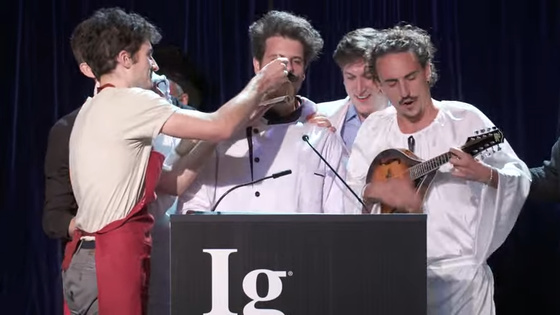
Pasta was also served to the Nobel Prize winners who presented the prize.
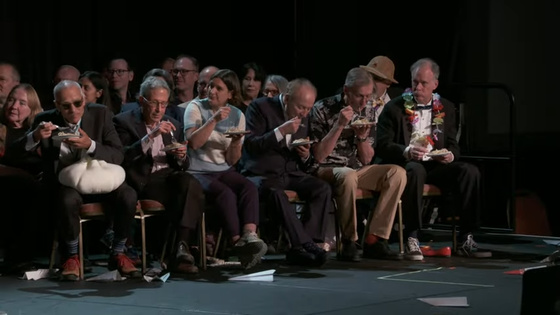
The award ceremony can be seen in the video below.
Ig Nobel Prize 2025 Award Ceremony Live Stream with Translated Subtitles / The 35th First Annual Ig Nobel Prize Ceremony [Japanese Subtitles] - YouTube
Related Posts:







